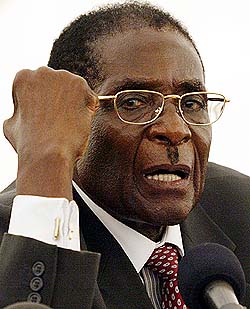Mugabe loves tennis, cricket and BBC, says former aide
 Johannesburg, Sept. 15 : He rules Zimbabwe with an iron fist, but when he wants to relax, he loves to watch tennis, cricket and the BBC -- a trio of very British institutions.
Johannesburg, Sept. 15 : He rules Zimbabwe with an iron fist, but when he wants to relax, he loves to watch tennis, cricket and the BBC -- a trio of very British institutions.
We are talking about Zimbabwe President Robert Mugabe, and the man revealing his favourite pastimes is his former press secretaryAndrew Mutandwa.
Mutandwa was forced to flee Zimbabwe after he broke ranks over his former hero''s brutal excesses. Now living in exile in London, he has spoken out about the chilling and sometimes bizarre realities of life with the African leader.
Mutandwa was handpicked to become the nation''s first trained black journalist after independence in 1980. In 1984 he was informed that he was to become his leader''s chief media spokesman.
"It was a job that I never applied for. It was thrust upon me and there was no question that I could refuse," the Scotsman quotes Mutandwa as telling the BBC.
Soon he was reporting for duty at 5 a. m. in order to brief Mugabe on world affairs at 8 a. m. sharp.
Mutandwa says that he would regularly work on Mugabe’s speeches until 10 p. m.
"I am pushed to remember any times when I saw Robert Mugabe actually smile or laugh. He is not a man who likes to betray his inner feelings. The only times I ever saw him completely relaxed and content was when he was watching cricket. I was unfamiliar with the sport, but he took the time to explain all the rules to me. He loved the game,” he says.
"Mugabe was also happy watching tennis. He made a point of watching the big tournaments like Wimbledon on TV and talked about tennis a lot," he adds.
"If Mugabe had any other interests apart from keeping in control of the country and sport then I wasn''t aware of them," he said.
"He hardly ever drinks. He also exercises every morning and again before bed."
Mutandwa, who worked for Mugabe until 1999, described his employer as a cold, intense individual who was unable or unwilling to engage emotionally.
He said that his only friend, an army comrade from Zimbabwe''s guerrilla war of liberation, committed suicide after independence.
"After that he kept everyone at arm''s length. He rarely showed any emotion whatsoever."
Yet he recalled one occasion when Mugabe flew into a rage, after receiving a report that revealed his brother-in-law, who ran the nation''s electricity firm, was a lazy, corrupt womaniser.
"He threw the report on the floor and shouted ''lies, lies''. Mugabe is an elderly man, but strikes fear into the entire nation with a shake of his fist."
Mutandwa, who never witnessed the regime''s brutality, described how the despot based Zimbabwe''s secret services on those in North Korea and Stalinist Romania.
"Mugabe was very close friends with Nicolae Ceausescu and he taught him how to control people and organise his secret police."
He also spoke of how the one-time liberation hero was hooked on the BBC World Service. "Mugabe admired Britain and the BBC very much, but that changed when the British journalists started reporting what was actually happening in Zimbabwe."
Mutandwa said he became disillusioned after learning that Mugabe''s forces massacred his political rivals and buried them in mass graves in Matebeleland.
He began penning reports for independent newspapers criticising Mugabe for corruption and human rights abuses. Eventually he left the government and tried to expose the nation''s Aids epidemic.
"A friend who worked in intelligence told me that it would probably be a good idea if I went away for a while. He didn''t have to say any more."
Now 52, Mutandwa is studying for a degree in mental health with a view to returning to co-ordinate a programme to assist those tortured and traumatised by Mugabe''s excesses.
But he said: "Mugabe will not relinquish power willingly and I am very pessimistic about the latest talks." (ANI)